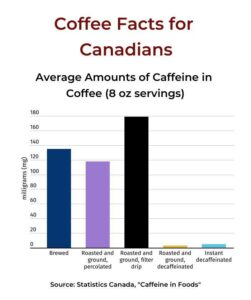
Students seek healthier alternatives amid coffee dependency concerns
Nutritionist advocates gradual shift to healthier caffeine choices
By JACOB ARON LEUNG
This story was originally published on Nov. 1, 2023.
Students who turned to coffee for academic support and developed a dependency are looking at alternatives to replace their reliance on the beverage.
The USDA Foreign Agricultural Service reported in June that Canadians’ coffee consumption has steadily increased over the past five years. According to Statistics Canada, Canada imported 15.6 million kilograms of coffee in July 2023 alone.
However, without moderating coffee intake, this popular habit can lead to negative health effects.
Meg De Jong, a registered holistic nutritionist in Vancouver, said increased coffee consumption comes with greater stress levels, unregulated blood sugar levels, dehydration and digestive issues.
Many Canadians drink coffee for breakfast, but she said it should not be their sole breakfast choice.
“If you’re drinking a lot of coffee on an empty stomach, it can actually lead to things like stomach ulcers,” she said.
Gurleen Goraya, a first-year education student from SFU, is trying to reduce her coffee consumption due to its heavy presence in her life.
“I do think as someone who has been drinking it for a couple of years, I don’t think it’s helping as much as I want to anymore,” said Goraya.
She said she could go without coffee for a day, but the ensuing migraines from coffee withdrawal lures her back to the drink.
“I wish I wasn’t so dependent on it like I am now,” she said, adding she is now used to the alertness coffee gives her.
Like Goraya, Langara student Zack Dawe also relies on coffee.
“I’m sure if I was no longer physically addicted to caffeine, then I would feel fine with not having a coffee in the morning,” said the third-year geography student. “But as of right now, I would not feel fine.”
Elisabeth Flosadottir started drinking coffee when she began studying with Vancouver Community College’s dental assistant program this semester.
Despite being a new coffee drinker, she has already noted coffee’s addictive properties.
“Once it starts to become a part of your life, it’s kind of hard to stop drinking it.”
Health-conscious caffeine substitutes
Flosadottir said drinking water, taking a vitamin B12 and getting fresh air help seem to help her remain alert when she runs out of coffee.
“I probably could be awake [without it], but just not feeling productive,” said Flosadottir.
De Jong, who helps her clients navigate conditions like anxiety through nutrition, said B12 can be an effective way to boost energy levels.
“Stress can deplete our B vitamins, so supplementing with B12 can be really helpful with that,” De Jong said.
According to the Food Bioscience journal, individuals with diabetes, hypercholesterolemia, or obesity are advised to consider using coffee substitutes like chicory, dandelion, or artichoke due to their high inulin content.
Those looking to cut down on their coffee consumption should start slowly with healthier caffeinated options, said De Jong. She suggested matcha, which contains the amino acid L-theanine.
L-theanine, primarily found in tea leaves and mushrooms, helps “metabolize the caffeine more steadily throughout the day” compared to other sugary and highly caffeinated counterparts, said De Jong.
“Even though matcha [can] be quite stimulating for people because there’s the caffeine, the L-theanine actually is quite a relaxing substance.”


I’m all for cutting down on consumption of anything… but….
“expert analyzes coffee’s impact on health”…. there is absolutely no reference to an analysis on coffe’s impact on health… by an expert or otherwise. All that is listed in this article are facts about coffee production and opinions from individuals… oh… and a hyperlink to a nutritionist’s website rather than a specific article.
Please consider an erratum for this article’s title. I might have found this to be an interesting read had it not been for the misleading statement in the title.